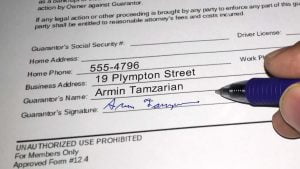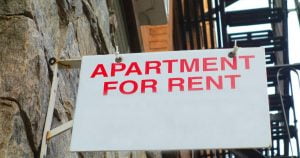2025 NYC Apartment Guarantor Guide
Go Back To Previous PageIn New York City real estate, guarantors are quickly becoming the norm. Most transplants to the Big Apple first learn about them when they realize they don’t have the income requirements ready for an apartment in the area. Third-party guarantors were originally a UK-based concept, where companies or professionals would guarantee that you could make rent payments for an additional fee. Nowadays, many NYC apartments accept guarantor leases and guarantor insurance. With the rent price taking more out of peoples’ paychecks than ever, those firms are becoming a major staple in New York City. They now have an essential place in the real estate scene in NYC, and it will be a staple in this area. But are guarantors allowed to be used outside NYC?
realize they don’t have the income requirements ready for an apartment in the area. Third-party guarantors were originally a UK-based concept, where companies or professionals would guarantee that you could make rent payments for an additional fee. Nowadays, many NYC apartments accept guarantor leases and guarantor insurance. With the rent price taking more out of peoples’ paychecks than ever, those firms are becoming a major staple in New York City. They now have an essential place in the real estate scene in NYC, and it will be a staple in this area. But are guarantors allowed to be used outside NYC?
What Are Apartment Guarantors in NYC?
Guarantors mean people or companies willing to act as a “financial backup” for a person who wants to rent an apartment. For a fee, these individuals will offer to pay rent if they cannot make ends meet or act as a “proxy deposit.” When you have one, someone backs you up as a responsible renter.
Is a Guarantor the Same as a Cosigner?
Not exactly. A guarantor has no right to possess or occupy the apartment (unless you and anyone else on the lease, such as your roommate(s), agree). This is essentially the main difference between a lease guarantor and a cosigner; a cosigner is treated as another tenant with permission to occupy the apartment.
Many folks use the terms guarantor and cosigner interchangeably, mainly when a family member (typically a parent) guarantees a lease. Still, guarantors generally need to meet stricter income requirements to help you sign a lease.
What May Make You Require Guarantor Insurance?
There are a lot of different reasons why you may need one. These include:
- Poor Credit history. A score below 600 may make it hard to rent.
- Low Deposit. You might be asked for one if you can’t make the initial deposit.
- Bad Finances. Some apartments will require you to have a certain amount of cash in your bank account, and a guarantor will get you around that loophole.
- Non-Residency. People who aren’t US citizens or are locals in NYC may need one by default.
Who Can Be An Apartment Guarantor?
In most cases, a guarantor is someone who can afford your apartment and has an excellent credit report. They have enough liquid assets to cover the costs of at least one to three months and extra for any additional rent. Anyone, including a friend or family member, can technically be a guarantor, and that person needs to show tax returns or pay stubs.
Sometimes, they may also be asked to pay a little extra for the deposit. However, this is far from the norm. A guarantor is a cosigner on a lease agreement. To be one, you will need a good credit score above 700 and an annual income that’s 80 times the monthly rent of the entire apartment.
What Are Professional Guarantor Companies?
Professional guarantor insurance companies are groups that act as guarantors for renters. These companies are almost exclusively found in New York City and provide essential services. People who move to NYC don’t always have a friend who can be a guarantor. Since some folks won’t have NYC-local buds, these companies are there to help them out.
Finding a guarantor is easy. Currently, there are three leading companies in New York City. They are:
- Insurent Lease Guaranty
- The Guarantors
- Leap
How Much Do They Charge?
This tends to be a percentage of the rent rather than a flat fee. The fees and rent percentages also vary depending on the apartment’s price, with high- end apartments costing extra. You may have to call each company to determine how much you must pay.
end apartments costing extra. You may have to call each company to determine how much you must pay.
Can You Use Guarantors Outside New York City?
While New York City is the most common city where people use guarantors, it’s not the only one. No laws currently bar you from using a rental guarantor insurance company in any tri-state area. However, that doesn’t mean it’s widespread, nor does this mean that apartments will allow for it. Here’s what people need to know about using one outside the city:
- You will need to ask your apartment landlord first. Most landlords are amenable to it as long as they are legal and capable of handling the risk. Not all landlords will be OK with it, though!
- Then, you must ask what type of guarantors you want. Some will allow friends, while others require you to go to a professional company.
- Finally, the most challenging part of finding a company is finding one that works in your area. However, each company services a range of places.
Note: State laws in the tri-state area currently allow using guarantors. However, that doesn’t mean local laws are also OK with it. Cities have the right to ban guarantor insurance use if they so choose. While we have not heard of any cities doing this, it’s still something you should be aware of.
Can You Use Multiple Apartment Guarantors Per Lease?
On paper, the answer is yes. Most landlords are OK with having multiple people act as guarantors on a lease as long as their total incomes will be 80 times the annual rent. However, this is still one of those things you need to ask about before you assume it will be OK with your landlord’s requirements. Some want a single one exclusively.
What Should Your Real Estate Agent Know About Guarantor Use?
Every apartment will have its policy, which means pairing you with a suitable apartment isn’t always easy. Tell your agent as soon as possible if you need one to rent in New York or anywhere else. This way, they can pair you with an apartment that would work well with the lifestyle you want to lead.
At NestApple, our brokerages are trained to help match you with the best possible home for your budget and lifestyle. Call us if you want to find that dream apartment, co-op, or house. We are here to make things easier and advise you throughout the process.
What About Paying Extra Money to Get Approved For an Apartment?
It used to be that applicants could pay multiple months of rent upfront or pay an extra security deposit to get approved for an apartment. However, this is no longer the case with the recent enactment of New York’s Housing Stability and Tenant Protection Act of 2019 (“HSTPA”). Specifically, the HSTPA limits all security deposits in New York State to just one month’s rent.
Additionally, the HSTPA prohibits landlords from collecting future rent in advance, a common practice of NYC landlords renting to students or people with bad credit. As such, applicants will probably depend more on institutional guarantors if they can’t locate one independently.


